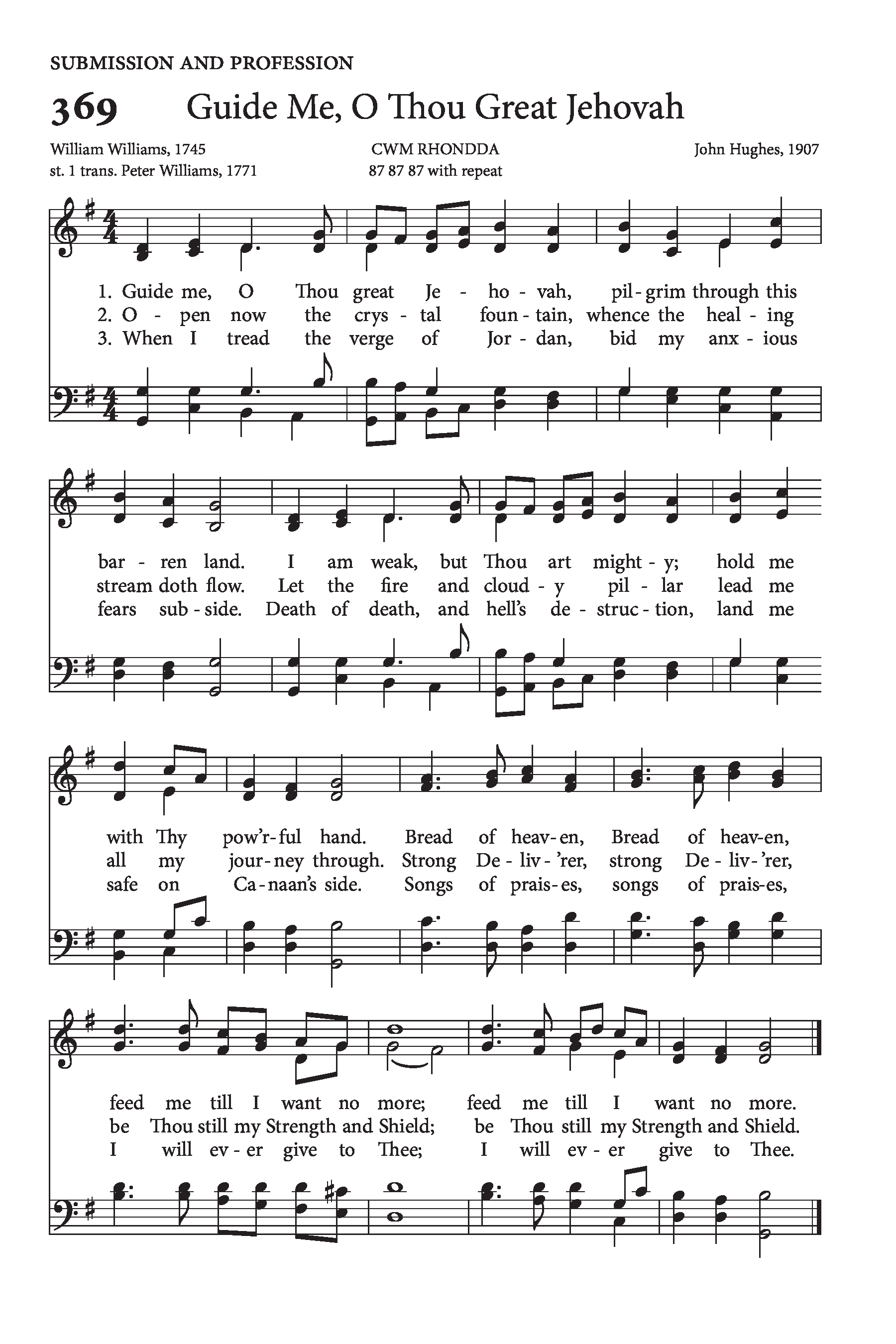Guide Me, O Thou Great Jehovah
By William Williams
Lyrics
pilgrim through this barren land;
I am weak, but you are mighty;
hold me with your powerful hand.
Bread of heaven, bread of heaven,
feed me now and evermore,
feed me now and evermore.
where the healing waters flow.
Let the fire and cloudy pillar
lead me all my journey through.
Strong Deliverer, strong Deliverer,
ever be my strength and shield,
ever be my strength and shield.
bid my anxious fears subside.
Death of death, and hell's Destruction,
land me safe on Canaan's side.
Songs of praises, songs of praises
I will ever sing to you,
I will ever sing to you.
Bible Reference
Psalm 31:3
About This Hymn
“For Thou art my rock and my fortress; therefore for Thy name’s sake lead me, and guide me.” — Psalm 31:3 (KJV)
The people of Wales have long been known for their deep love of music, especially congregational singing. From the ancient traditions of the Druids to the modern-day Eisteddfod, an internationally celebrated music and poetry festival still held in Llangollen, the Welsh heritage is richly infused with song. It is from this vibrant musical culture that the beloved hymn “Guide Me, O Thou Great Jehovah” emerged—a hymn that continues to resonate deeply within and beyond Welsh borders.
In the early 18th century, the spiritual revival sweeping across Great Britain found powerful expression in Wales through the ministry of Howell Harris, a passionate preacher who combined evangelistic fervor with stirring congregational song. Around the same time, George Whitefield and the Wesleys were conducting similar revival campaigns in England. One young man profoundly affected by Harris’s preaching was William Williams, who originally planned to pursue a career in medicine. After hearing Harris speak, Williams surrendered his life to Christ and resolved to enter the Christian ministry.
Though Williams initially served in the Anglican Church, he soon grew uneasy with its formal and ritualistic nature. Emulating Harris, he chose instead to devote his life to itinerant preaching, viewing all of Wales as his parish. For the next forty-three years, Williams traveled an estimated 100,000 miles on horseback, proclaiming the gospel and writing hymns in the Welsh language. Despite many personal hardships, he became widely known and deeply loved as “the sweet singer of Wales.” A gifted poet as well as preacher, Williams composed approximately 800 hymns, nearly all in Welsh. His influence has often been compared to that of Isaac Watts in England—though many of Williams’s hymns remain untranslated, his impact on Welsh religious life is enduring and profound.
“Guide Me, O Thou Great Jehovah” remains Williams’s most famous hymn. It was first published in a 1745 hymnal printed in Bristol, England, under the original title “Strength to Pass Through the Wilderness.” The hymn consisted of five six-line stanzas, richly laced with biblical imagery. In 1771, a man named Peter Williams (unrelated to the author) translated three of the stanzas into English. A year later, another English version appeared—possibly by William Williams himself, or his son John—incorporating Peter Williams’s first stanza and translating additional verses from the original Welsh. Most modern hymnals now include only three stanzas, though various versions and translations have appeared through the years.
The hymn draws deeply from Scripture, using the Israelites' journey through the wilderness to Canaan as a metaphor for the Christian life. It is filled with vivid and symbolic biblical references: the “bread of heaven” (manna), the “crystal fountain” (see 1 Corinthians 10:3–4), the “fire and cloudy pillar”, the “verge of Jordan”, and “Canaan’s side.” These images convey the trials, guidance, and ultimate victory of the believer on the journey through a spiritual wilderness to the promised rest of Heaven.
The tune most commonly associated with the hymn today, known as “Cwm Rhondda”, was composed in 1907 by John Hughes, a Welsh musician well-known for writing anthems and Sunday School music. Hughes composed this rousing melody for the Baptist Cymanfa Ganu, a traditional Welsh singing festival, held that year at Capel Rhondda in Pontypridd, Wales. Printed on leaflets for the occasion, the powerful pairing of Williams’s text with Hughes’s tune quickly gained popularity. To this day, the hymn holds a cherished place in Welsh culture. It is not uncommon to hear it sung spontaneously at large public gatherings, including rugby matches, where crowds join together in spirited unison.
“Guide Me, O Thou Great Jehovah” is not only a treasured Welsh hymn but also a global favorite, having been translated into more than seventy-five languages. Its timeless message, robust imagery, and strong, majestic melody give it broad and enduring appeal. The hymn remains a bold prayer of trust and guidance—expressing the heartfelt cry of pilgrims in every generation: “Guide me, O Thou great Jehovah, / Pilgrim through this barren land.”


📬 Subscribe to Our Devotional Updates
Receive weekly hymns, devotionals, and website features directly in your inbox.
Hymn Information

- Category: Hymn
- Author/Writer: William Williams (1745)
- Added: June 12, 2025
- Last Updated: June 12, 2025
- Views: 1970
MIDI File
Hymns from 1745
Recent Blog Posts
-
 How to Develop a Consistent Prayer Schedule
How to Develop a Consistent Prayer Schedule
Dec 11, 2025 -
 How to Forgive Someone Who Deeply Hurt You
How to Forgive Someone Who Deeply Hurt You
Dec 11, 2025 -

-
 Why Christmas Is Celebrated on December 25
Why Christmas Is Celebrated on December 25
Dec 11, 2025 -
 10 Most Renowned Hymn Writers
10 Most Renowned Hymn Writers
Dec 10, 2025
Visit Us on Social Media
Latest from X (Twitter)
Tweets by HymnalLibraryLatest from Facebook
Latest on YouTube
Daily Bible Verse
Disclaimer
The hymns, sheet music, MIDI files, and related content on this website are provided for educational and research purposes only.
- Public Domain: Many of the hymns featured here are in the public domain and may be freely used.
- Copyrighted Works: Some hymns may still be under copyright protection. Where applicable, permission has either been requested from the copyright owner, or the content is shared under the principles of fair use for educational purposes.
⚠️ Important Notice: If you wish to reproduce, distribute, or use any copyrighted hymn beyond personal study or educational use, you must obtain permission directly from the copyright holder. This website does not grant any rights for commercial use yet.
If there is any other question please address it to us in our Contact Page, for further assistance. Thank you for using the site. May God Bless You.